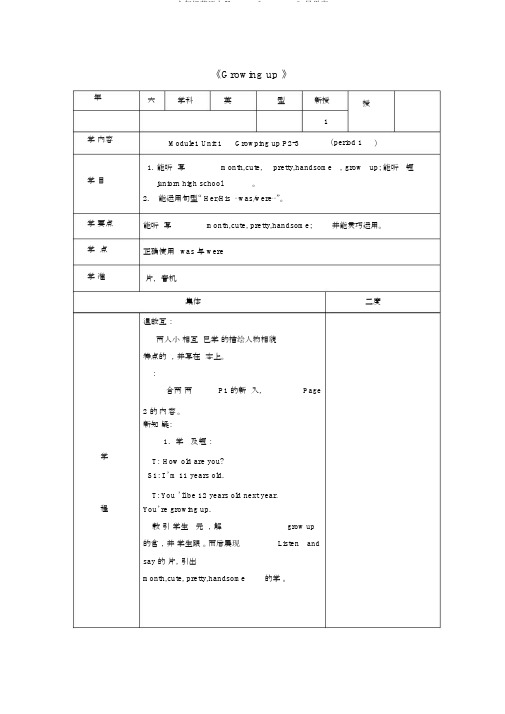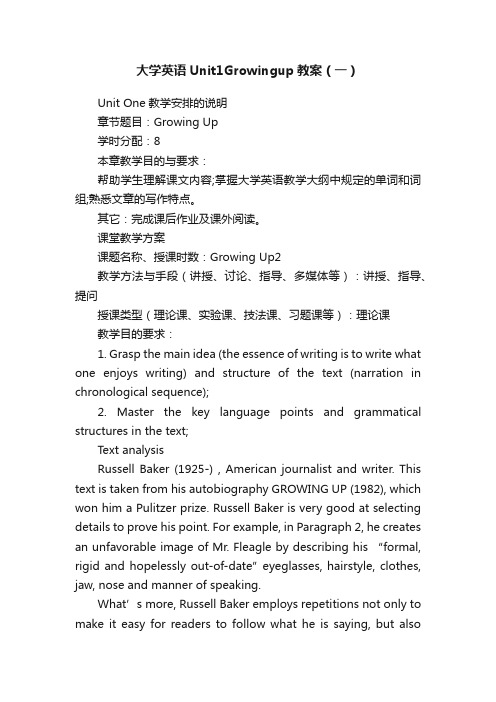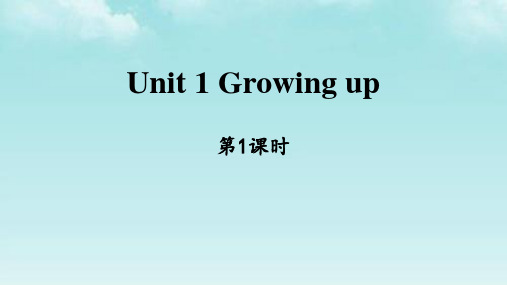Unit 1 Growing up第一课时 (21张PPT)教案导学案
Unit1GrowingUp短文巧记单词导学案高中英语选择性

新外研版高中英语选择性必修二Book 5 Uni t 1短文巧记单词一、朗读并翻译理解Lifelong Little Prince 永远的小王子In most countries, turning 18 marks stepping from childhood to adulthood. Reach this milestone, the legal minimum age of majority, means you can get a driving licence, a suitable loan for your very own apartment and the right to vote in the general election. Meanwhile, you must obey traffic rules when behind the wheel, earn a steady wage to pay the deposit and taxes, get mature enough to understand politics.However, after seeing intimately a great many selfish grownups concerned with matters of consequence , you may find it hard to distinguish instantly right from wrong at a glance; you may lose your virtues such as integrity and jump to conclusions without enough evidence; you may be tempted to lay aside your dreams and devote yourself instead to arithmetic in playing bridge and golf. How to handle these subtle and gradual changes?The author of The Little Prince no doubt have a say in this question. After seeing a picture of a boa constrictor swallowing its prey whole without chewing, he pondered over it deeply and drew a snake digesting an elephant. However, most grownups seeing his masterpiece titled “digestion” didn’t approve of his career option, which was disheartening and tiresome. That’s why he made mitment to teaching us memorable hints to be an Adult.To give an example, he thought we should stick to our career options, including a librarian, an ambulance driver, or a pilot in an airline; we should cherish varied experiences we’re presented with: being a boarder, sitting a major exam, muting to work, giving a presentation in suit and necktie, forming bittersweet bonds with others, doing household routines, or signing an organ donation agreement.二、核对译文在大多数国家,年满18岁标志着从童年迈入成年。
Unit 1 Growing up 第一课时 导学案

C. I was ten years old.
4.Was her hair short or long?
A. Her hair was long.
B. She was long.
C. Her hair were short.
5.Was she a primary student at that time?
A.Yes, she wasn’t.
B.No, she was.
C.Yes, she was.
三、按要求写出下列各词
1.hair(复数)__________ 2.eyes(单数)___________
3.were(单三)___________ 4.short(反义词)__________
5.is(过去式)__________
1.Free talk.
T:Do you often take photos?
S:Yes.
T:Look, these my photos. Can you show me yours?
......
2.听读listen and say (P2)
尝试准确读出新单词,理解文章含义,找出不理解的词句
Unit1Growing up第一课时导学案
模块
Module 1
Getting to know
each other
单元
Unit 3
Growing up
年级
6
学习目标
1.掌握本单元的核心词汇和句型
2.能用He/she was....His/her...was/were描述某人过去某个阶段的年龄和外貌特征
3.请一位同学展示自己以前的照片,小组合作,谈论照片
六年级英语上册Unit1《Growingup》导学案

年学内容学目学要点学点学准学程《Growing up 》六学科英型新授授1Module1 Unit 1Growping up P2-3(period 1)1.能听写month,cute,pretty,handsome,grow up; 能听短juniorn high school。
2.能运用句型“ Her/His ⋯was/were⋯”。
能听写month,cute, pretty,handsome;并能灵巧运用。
正确使用was 与 were片,音机集体二度温故互:两人小相互已学的描绘人物相貌特点的,并写在本上。
:合两两P1 的新入,Page2的内容。
新知疑:1.学及短:T: How old are you?S1: I ’m 11 years old.T:You ’ll be 12 years old next year.You’re growing up.教引学生元,解grow up的含,并学生跟。
而后展现Listen andsay 的片,引出month,cute, pretty,handsome的学。
2.出示 Listen and say 的片,播放音,学生听看片。
3.再次播放音,教板中出的生 was 和 were, 通与 is和are比,帮助学生理解。
稳固:学生填空达成P3 中的反,并核学答案。
拓展延长:程达成两两中精要沟通中的三个。
Unit 1 Growing up(1)板Month cute pretty handsome grow upHer/His⋯was/were⋯He/She was/were ⋯ months/years old.学反省年学内容学目学要点学点学准学程堂教案六学科英型新授授2Module 1 Unit 1Growping up P4-5( period 2)1.帮助学生故事《小蝌蚪找》。
2.帮助学生稳固和合运用本元所学的知和技术。
Catch 的用法;能抓住故事中的关信息,认识故事粗心。
大学英语Unit1Growingup教案(一)

大学英语Unit1Growingup教案(一)Unit One教学安排的说明章节题目:Growing Up学时分配:8本章教学目的与要求:帮助学生理解课文内容;掌握大学英语教学大纲中规定的单词和词组;熟悉文章的写作特点。
其它:完成课后作业及课外阅读。
课堂教学方案课题名称、授课时数:Growing Up2教学方法与手段(讲授、讨论、指导、多媒体等):讲授、指导、提问授课类型(理论课、实验课、技法课、习题课等):理论课教学目的要求:1. Grasp the main idea (the essence of writing is to write what one enjoys writing) and structure of the text (narration in chronological sequence);2. Master the key language points and grammatical structures in the text;Text analysisRussell Baker (1925-) , American journalist and writer. This text is taken from his autobiography GROWING UP (1982), which won him a Pulitzer prize. Russell Baker is very good at selecting details to prove his point. For example, in Paragraph 2, he creates an unfavorable image of Mr. Fleagle by describing his “formal, rigid and hopelessly out-of-date”eyeglasses, hairstyle, clothes, jaw, nose and manner of speaking.What’s more, Russell Baker employs repetition s not only to make it easy for readers to follow what he is saying, but alsoimpress them more deeply. For example, in Paragraph 2, there are 9 prim’s or primly’s in as few as 3 sentences. Thus readers will have in their mind a vivid picture of what Mr.Fleagle looked like. In Paragraph 5, there are 5 I wanted’s. They help to emphasize Russell Baker’s strong desire to write for himself.On the other hand, Russell Baker is also expert in avoiding repetition by employing synonymous words and phrases. Here are some examples:a.dull, lifeless, cheerless, tediousb.turn out, write, compose, put downc.formal, rigid, prim, correct, proper, respectabled.recapture, relivee.pleasure, delight, happiness教学重点、难点:Word and Expressions:1.off and on: from time to time, now and again, irregularlyIt has been raining on and off for a week. That’s why the clothes feel damp.As her baby slept soundly, the mother was able to doze off and on in a chair.She managed to support herself by working on and off as a waitress.2.possibility: the state of being possibleIs any possibility of life on Mars?They haven’t arrived. There is a possibility that they have taken the wrong road. 3.take hold: become established The idea of one child only has taken hold in many Chinese families.O ld habits die hard. That’s why you should stop smoking before the habit takes hold.4.associate…with…:join or connect together: connect orbring to mindWe associate Egypt with pyramids.Jim wished to forget everything associated with his former life.People often associate the old days with good times, and seem to forget the hardship they suffered.5.turn out: produceNew computers are soon outdated since newer models are turned out constantly American film studios turn out hundreds of films every year.6.tedious:The movie was so tedious that many viewers left before it was over.Laura found George to be tedious and decided not to see him any more.7. anticipate: expectThey anticipate that the deaths from AIDS will have doubled by 2020.We anticipate running into problems in carrying out the medical welfare reform.The police had anticipated trouble from the soccer fans and were at the ground in large numbers.8. reputation:Premier Zhu Rongji has a high reputation as a statesman in the world.Jim Kerry has quite a reputation for being co9. inspire: fill somebody with confidence, eagerness, etcMartin Luther King, Jr’s speeches inspired people to fight for equal treatment of African Americans.The last leaf on the tree that never fell off inspired the dyingpatient with the will to live on.Mr. Green is very dull as a lecturer. He’s rigid and old-fashioned, and doesn’t have the faintest idea of how to inspire.10. rigid: fixed in behavior: based on correct or accepted rulesThe rigid headmaster would button up his clothes even on the hottest days.If he had been a little less rigid about things, his daughter would not have left home at such a young age.11. out-of-date: old-fashionedNew words are constantly added to our vocabulary while some old words go out-of-date.Although her clothes were out-of-date, the old woman appeared clean and dignified.12. severe: completely plain: stern, strict; causing great pain, difficulty, worryEarnest Hemingway is known for his severe writing styleOnly those who have undergone severe training can be accepted into air force.The severe chest pain experienced by the vice-president proved to be a heart attack.13. tackle: deal withThe classroom was quiet as students were busy tackling the final exam.Toshiba recently designed a robot that can tackle almost any kinds of housework.14. face up to: be brave enough to accept or deal with (a problem or difficulty)Now that your daughter is born, you’ll have to face up to the responsibilities of being a father.Yeltsin faced up to the fact that he was no longer fit for the Russian presidency and resigned on the New Year’s Eve.15. scan: look through quicklyThe banker scanned the financial section of a dozen newspapers over breakfast.Scan the book and tell me what it is about.16. image: a picture formed in mindMany pop stars try to improve their public image by participating in charity events.17. recall: bring back to the mind; rememberI can’t recall her name.I don’t recall ever meeting her.She recalled that she had to see the doctor again that afternoon.The policeman asked the old lady to recall as much about the accident as possible.18. violate: act againstSpeeding in downtown areas violates traffic regulations.A country isn’t respected if it violates an international agreement.19. hold back: prevent the expression of(feelings, fears, etc. )People could hardly hold back their anger when they found that millions of dollars of public funds had been used to build luxurious houses for city officials.When I saw my little boy crying bitterly over the death of his pet dog, I could hardly hold back my tears.。
六年级英语上册Unit1《Growingup》(第1课时)教案

Growing up讲授新课 Ⅱ. Presentation 1.T: This is month. T his is cute …. This class, we'll learn something about growing up.(Show the pictures of the new words on the screen. Learn the meanings of the new words: month ,cute ,pretty ,handsome ,turtle ,catch ,fly ,grow up ,junior high school ,born)2.Work on Listen and say. Play the recording for the Ss to listen and repeat the new words. Ss read the new words and try to remember them.3.讲练结合。
Do you know Sally ?Complete the notes about the photos. 2·1·c·4. Ss read and try to remember the phrases. Ⅲ.Grammer.一般过去时:(1)定义:过去时间里发生的动作或者存在的状态(2)结构:主语+was/were+其他 含be 动词的一般过去时肯定式:主语+was/were+其他(am ,is 的过去式是was ;are 的过去式是were.) 例如:教师先领读,然后男生读,女生读,链式读,给出汉语说英语,给出英语说汉语,最后跟读正音。
紧凑的教学环节使学生能够全身心的投入学习中。
1.学生紧跟老师的讲解,熟悉并牢记一般过去时的表达结构式。
2.自己尝试用一般过去时来造句。
1.经过反复练习和学习,让学生以最快的速度轻松、愉快的掌握新单词。
上海教育版六年级上册英语《Growing up》PPT教学课件(第1课时)

In this photo, my____ In this photo, my____ He/ She was________ He/ She was________ His /Her___________ His /Her___________
Justin: Mum, where are you?
小贾斯廷在河里出生。(这时)是春天。他很小并且很黑。 他看看四周。他不能找到他妈妈。 贾斯廷:妈妈,你在哪里?
Soon he has a round head and a long tail. He meets a fish in the river. She also has a round head and a long tail.
例句:我的语文老师30岁。 My Chinese teacher is thirty years old.
Look and learn
cute
可爱的
handsome
英俊的;帅气的
pretty
漂亮的
Read a story
Little Justin was born in the river. It is spring. He is small and black. He looks around. He cannot find his mum.
在照片2中,萨莉一岁。她 的头发很短,她的眼睛很大。
In Photo 3, Sally was about six years old. She was a primary school student.
Unit 1 Growing up第1课时+示范教案(六上)

Unit 1 Growing upLook and learn; Listen and say第1课时一、教学目标1. 学习新词汇:month, cute, handsome, pretty, grow up。
2. 掌握句型:Hi s/Her … was/were …。
3. 能够初步运用核心句型Hi s/Her … was/were …谈论自己或家人不同成长阶段的外貌特征。
二、教学重难点重点:1. 掌握词汇:month, cute, handsome, pretty, grow up。
2. 掌握句型:Hi s/Her … was/were …。
难点: 能够初步运用核心句型谈论自己或家人不同成长阶段的外貌特征。
三、教学准备教学课件;学生准备自己不同年龄段的照片。
四、教学过程I. Warm-up1. Look and say课件出示三组人物对比图片,教师引导学生描述图片中人物外貌。
设计意图:复习描述人物外貌的句型,突出人物外貌的差异,为引出本课话题做铺垫。
2. Look and think课件出示Tim小时候与现在的照片,教师提问:What did/does Tim look like? What are the differences?设计意图:为学习新知识创设情境,通过呈现图片和提出问题引起学生的思考,激发学生的学习兴趣。
II. Presentation1. Look and learn(1)T: There are twelve months in a year. In this photo, Tim was three months old.呈现Tim小时候图片,介绍此时他的年龄,教师引导学生体会month的含义和用法,同时呈现介绍年龄的目标句型。
(2)呈现Tim小时候和现在的对比照片,引导学生体会cute和handsome的含义和用法,同时呈现描述人物外貌的目标句型。
(3)T: Now he is tall. He goes to junior high school.呈现Tim现在的照片,引导学生体会junior high school的含义和用法,同时呈现本课重点句型。
上海教育版英语六年级上册Unit 1《Growing up》ppt课件

Growing up
Getting to know each other
Getting to know each other
Please Translate
1 在图片1中,赛丽是一个婴儿,她大约有2个月大,她小巧玲珑。 2 在图片2中,赛丽1岁了,她是短头发,大眼睛。 3 在图片3中,赛丽6岁了,她是一名小学生了。 4 现在赛丽已经14岁了,她上初中了,她又高又漂亮,她的头发
Unit 1
Growing up!
June 六月
month
[mʌnθ] 一个月的时间;月份
cute
[kju:t] 可爱的
pretty
[ˈprɪti] 漂亮的
PPT模板:www. 1ppt.co m/ mob an/ PPT背景:/beiji ng/ PPT下载:/xiaz ai/ 资料下载:www. 1ppt.co m/zilia o/ 试卷下载:/shiti / PPT论坛:www. 语文课件:/keji an/yuwen/ 英语课件:/keji an/ying yu/ 科学课件:/keji an/kexue/ 化学课件:/keji an/huaxue/ 地理课件:/keji an/dili/
PPT素材:/s ucai/ PPT图表:www.1ppt .co m/tu biao/ PPT教程: /powerpoint/ 范文下载:www.1ppt. co m/fa n wen/ 教案下载:www.1ppt. co m/jia oan/
PPT课件:www.1pp t.co m/ kejian/ 数学课件:www.1ppt.c om/keji an/shuxue/ 美术课件:www.1ppt.c om/keji an/mei shu/ 物理课件:www.1ppt.c om/keji an/wuli / 生物课件:www.1ppt.c om/keji an/sheng wu/ 历史课件:www.1ppt.c om/keji an/lishi /
- 1、下载文档前请自行甄别文档内容的完整性,平台不提供额外的编辑、内容补充、找答案等附加服务。
- 2、"仅部分预览"的文档,不可在线预览部分如存在完整性等问题,可反馈申请退款(可完整预览的文档不适用该条件!)。
- 3、如文档侵犯您的权益,请联系客服反馈,我们会尽快为您处理(人工客服工作时间:9:00-18:30)。
1.Her hair _____ short last year.
A. is B. are C.was
2.She was ______ two months old.
A. about B. at C. in
3.How old were you in this photo?
A. I was ten year old.
B. I were ten years old.
C. I was ten years old.
4.Was her hair short or long?
A. Her hair was long.
B. She was long.
C. Her hair were short.
5.Was she a primary student at that time?
【新知预习】
1.重点句型
听读listen and say (P2),了解不同年龄阶段的Sally
体会句型She was....Her...wapretty, handsome, grow up
听录音,感知新知识,熟悉所学单词的发音
【课堂探究】
1.Free talk.
T:Do you often take photos?
S:Yes.
T:Look, these are my photos. Can you show me yours?
......
2.听读listen and say (P2)
尝试准确读出新单词,理解文章含义,找出不理解的词句
3.学会在与别人交流的过程中获取信息
学习重难点
1.单词month, cute, pretty, handsome, grow up,junior high school
2.句型He/she was....His/her...was/were
学法指导
尝试模仿小组合作交流练习法
课前准备
多媒体单词卡片学生自己的一些照片
3.请一位同学展示自己以前的照片,小组合作,谈论照片
Who is the girl(boy)?
How old are you now?
How old were you?
【巩固训练活动】
1.说一说
介绍自己以前的一张照片
I was....My...was/were...
2.游戏
踩气球
3.画一画
你的朋友三年前是什么样子?现在呢,请动手把他们的样子画出来。向同学展示自己的画作,再用语言表达出来。
【当堂检测】
一、选出不同类单词。
()1. A.cute B. desk C.classroom
()2. A.school B. handsome C.park
()3. A.hair B.handC. month
()4. A.pretty B.was C.were
()5. A.grow B. go C.tall
参考答案:一、ABCAC二、CACAC三、1.hair 2.eye 3.was
4.long 5.was
Unit1Growing up第一课时导学案
模块
Module 1
Getting to know
each other
单元
Unit 3
Growing up
年级
6
学习目标
1.掌握本单元的核心词汇和句型
2.能用He/she was....His/her...was/were描述某人过去某个阶段的年龄和外貌特征
A.Yes, she wasn’t.
B.No, she was.
C.Yes, she was.
三、按要求写出下列各词
1.hair(复数)__________ 2.eyes(单数)___________
3.were(单三)___________ 4.short(反义词)__________
5.is(过去式)__________
